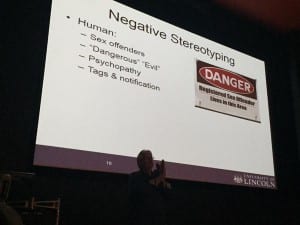by rbartels | Jun 13, 2015 | Forensic
On the 28th May, Dr. Ross Bartels was awarded £3160 from the British Psychological Society (BPS) as part of their International Conference Symposium Scheme. This scheme is designed to aid BPS Member Networks in showcasing – to an international audience – the variety and calibre of psychological research undertaken in the UK.
Dr. Bartels will use the grant to fund a research symposium at the European Association of Psychology and Law conference in Nuremburg, Germany (4-7th August 2015). Representing the Division of Forensic Psychology BPS network, this symposium will involve Dr Bartels, Prof Todd Hogue, and Ms Charlotte Wesson showcasing their recent work using tracking-based technology to assess sexual interests (with Prof Derek Perkins as the discussant).

More specifically, the symposium will include three oral presentations each reporting novel research using: 1) eye-tracking to assess areas on interest when viewing moving images (videos) of sexual coercion; 2) mouse-tracking to assess real-time decision processes during the appraisal of sexual stimuli; and 3) tablet-based technology to investigate kinaesthetic indicators of sexual interest.
More on this will be posted following the EAPL conference.
by rbartels | Jun 13, 2015 | Forensic
Last weekend (6-7th June), Prof. Todd Hogue joined a line-up of eight top canine behaviour experts (some of whom were also from the University of Lincoln) to present at the The National Dog Bite Prevention and Behaviour Conference. The event was run by renowned dog trainer Victoria Stilwell and was held at the University of Lincoln and was a great success. More info can be found here

Prof. Hogue’s talk – entitled “A Forensic Psychology Approach to Managing Dog Bite Risk” – involved discussing the idea that the principles underpinning research on offenders’ risk of reoffending can also be applied to dog bite risk (see image). Also, during the talk, Prof. Hogue discussed some of the novel research being undertaken by his PhD student Rachel Orritt.
The work discussed within the talk marks a novel approach to how techniques and insights from forensic psychology can be applied to other areas (in this case dog bite risk and dog aggression). Moreover, it demonstrates a unique way in which the area of dog bite prevention can be academically tackled. The FCRG looks forward to hear more about this new and fascinating topic.
by rbartels | Jun 13, 2015 | Forensic
Following on from our last FCRG post, we are delighted to hear that PhD student Julie Pattinson has been accepted to present her research at this year’s Postgraduate Psychology Affairs Group‘s (PsyPAG) Annual Conference in Glasgow this July.
Julie’s research focuses on gaining a deeper understanding of problematic gambling in older adults and her talk (entitled “Predictive Risk Factors for Problem Gambling Behaviour in UK Older Adults“) will report some new findings from a recent study. Also, Julie has been awarded a small bursary from the University of Lincoln to attend the PsyPAG conference.
Well done Julie!
This will be a notable PsyPAG conference as it marks their 30th anniversary. In light of this, it’s great to see the postgraduate members of the FCRG making a strong appearance at this event!
by rbartels | May 12, 2015 | Forensic
The FCRG is very pleased to announce that PhD candidate – Danielle Kettleborough – has received the inaugural Student Research Grant awarded by the National Organisation for the Treatment of Abusers. This is a great achievement and will be invaluable to Danielle’s doctoral research, which focuses on increasing the knowledge-base surrounding the users of child sexual exploitation material (CSEM). This research will have important implications for practitioners working with this offender group as it will provide a more specific understanding of their risks and needs.
The awarded research grant (totalling £723.34 ) will aid Danielle in accessing individuals from Prevention Project Dunkelfeld (Düsseldorf, Germany); a free, confidential service for individuals who have a partial or exclusive sexual preference for children that provides therapeutic help, stemming from a “health-based approach”. There are no mandatory reporting laws regarding CSEM in Germany, which allows for a comparison group of “undetected” individuals that would otherwise be inaccessible.
The majority of CSEM research has so far consisted of offender samples. As such, the theoretical developments to date could potentially be distorted due to biased empirical findings. Little is known about undetected CSEM users and the factors that distinguish this group from those who have been convicted of CSEM use. Investigating these individuals may raise important issues for prevention strategies, risk assessment, and treatment. The use of CSEM is of international concern, and this project could present the first comparison between the health-based and offending-based approach.
The research project is currently in the stage of planning and development and it is hoped that the collaboration will commence in September 2015.
by rbartels | May 11, 2015 | Forensic
This year’s second academic term has seen a number of key figures within the forensic field give some fascinating guest talks at the University of Lincoln (as part of the School of Psychology’s Research Seminar Series). Each speaker was invited by a member of the FCRG.
First, on 4th March, Dr. Miranda Horvath (Middlesex University), invited by Dr. Lynsey Gozna, gave an interesting talk entitled “Blurred lines: Exploring the impacts of lads mags and pornography on attitudes and behaviour”. In this talk, Dr. Horvath discussed findings from some of her most recent studies. In one interesting study, participants were presented with descriptions of women taken from: 1) lads’ mags; and 2) comments made by convicted rapists. However, participants were blind to the source of the description. The findings showed that participants could not distinguish the source of the quotes. Moreover, male participants identified more with the descriptions made by rapists than lad mags, possibly explained by the fact that lads mag quotes were rated as being more derogatory. Dr. Horvath suggested that these results support the hypothesis that lads mags reinforce and normalise hostile forms of sexism. In the second half of the presentation, Dr. Horvath outlined some of the core findings from an ongoing project looking into the effects that pornography can have on children and young people’s values, attitudes, beliefs, and behaviour.
A week later, on 11th March, Prof. Theresa Gannon (University of Kent), invited by Dr. Ross Bartels, gave a talk entitled “Adult Deliberate Firesetting: Developments in Theory, Research, and Practice”. In this presentation, Prof. Gannon gave an overview of the theoretical and empirical findings that have emanated from a major project on adult firesetters; a relatively neglected forensic population. Prof. Gannon described the recent Multi-Trajectory Theory of Adult Firesetting (M-TTAF) along with research findings on the psychological characteristics and mental health problems of fire-setters. Some of the key findings were that firesetters have higher levels of anger-related cognitions, interest in serious fires, identification with fire, and lower levels of fire safety awareness than non-firesetters. Also, Prof. Gannon and her team found Borderline Personality traits (e.g., poor impulse control, interpersonal issues) to be a strong discriminator between firesetters and controls. Finally, Prof. Gannon presented new and promising findings on the efficacy of the “The Firesetting Intervention Programme for Prisoners”.
Last but not least, on 22nd April, Dr. Tamara Turner-Moore (Leeds Beckett University) and Dr. Mitch Waterman (University of Leeds), invited by Prof. Todd Hogue, presented a talk entitled “They fear that they’re gonna be viewed as a massive deviant fantasy and penis”: Research on sexual offenders’ sexual thoughts and practitioners’ reflections on the implications for treatment. In this presentation, Dr. Turner-Moore and Dr. Waterman provided an overview of the ‘Sexual Thoughts Project’ (STP); an extensive international survey examining the sexual thoughts and fantasies of community men (n = 6000+) and men convicted of sexual offences (n = 93). The core findings from the STP were presented, particularly those comparing the content of sexual thoughts in non-offenders and sexual offenders. Also, the two researchers gave an overview of the work produced by a ‘think tank’ (comprised of the STP researchers, the Chair of the Practice Committee of NOTA, key UK policy-makers, and treatment providers from prison, probation, mental health, and community services) developed to explore the practical implications of the initial STP findings. The initial work of the think tank was thought-provoking and showcased ways in which this important research can be implemented in practice.
Each talk provided a fascinating insight into some of the core topics and issues within Forensic Psychology at the moment, and we are extremely grateful to each of the speakers for taking the time to visit and share their work with our department.
The FCRG team are now planning the guest speakers for next semester (Autumn 2015), with the aim to make them as interesting and varied as this semester (and year) has been.


